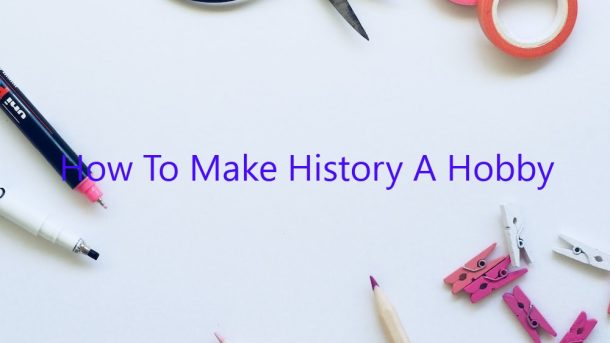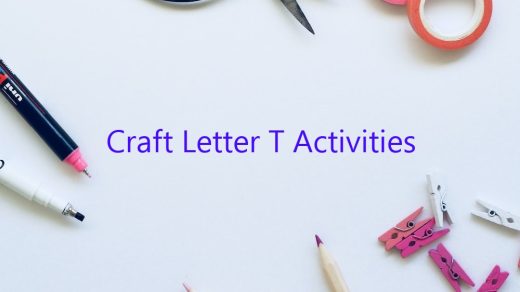Making history a hobby can be a fun and rewarding experience. There are many different ways to get involved in historical research and interpretation, and each person’s approach to the hobby will be unique. Here are a few tips on how to make history a hobby:
1. Choose a focus.
When starting out in history, it can be helpful to choose a specific focus or area of interest. This can help to narrow down the research process and make it more manageable. Some people may choose to specialize in a certain time period or geographical region, while others may be interested in the social and economic history of specific groups or communities.
2. Read widely.
One of the best ways to improve your historical knowledge is to read as widely as possible. This can include both academic and popular history books, as well as articles, essays, and blog posts. It’s also important to listen to podcasts, watch documentaries, and explore other forms of historical media.
3. Attend talks and lectures.
Attending talks and lectures on historical topics can be a great way to learn more about specific subjects and meet like-minded people. Many museums and historical societies hold regular events that are open to the public, and these can be a great way to gain new insights into history.
4. Join a local history group.
If you live near a historical site or community, there may be a local history group that you can join. These groups usually meet on a regular basis to discuss and explore the history of the area. They can be a great way to learn more about your local area, and many groups also organise regular trips and outings.
5. Use social media.
Social media can be a great way to connect with other history enthusiasts and learn about new historical projects and initiatives. There are many different history-related groups and pages on social media, and it can be a great way to find out about new resources and connect with other people who share your interests.
6. Attend historical re-enactments.
Historical re-enactments can be a great way to learn more about history first-hand. They usually involve people recreating historical events or scenes, and can be a great way to learn about the customs and dress of different periods. They can also be a lot of fun, and are a great way to meet new people with similar interests.
7. Visit historical sites.
Visiting historical sites is a great way to learn more about the past. Many historical sites have museums attached to them, which can give you a more in-depth understanding of the site’s history. Some historical sites are also open to the public, so you can explore them at your own leisure.
8. Use online resources.
The internet is a great resource for historical information. There are many different websites and online databases that you can use to research specific topics. You can also find old maps, photographs, and other historical documents online.
9. Write your own history.
One of the best ways to learn about history is to write your own. This can involve keeping a journal or blog, or writing short stories or articles about historical events. It can also be fun to create your own historical simulations or games.
10. Have fun!
Above all, remember to have fun while you’re learning about history. There’s no wrong way to approach the hobby, so don’t feel like you have to stick to the strict rules of academia. Try out different methods and see what works best for you.
Contents [hide]
Can you study history as a hobby?
Can you study history as a hobby?
Historians are people who love digging through the past to uncover stories and learn about what happened. This can be a very fulfilling hobby, but it also takes a lot of time and effort. Here are some things to consider if you’re thinking about studying history as a hobby.
First, you need to ask yourself why you want to study history. What interests you about it? Do you want to learn about specific events or people in history? Or do you want to gain a general understanding of how history works?
Once you have a clear idea of what you want to learn, you can start selecting the resources that will help you the most. There are many different ways to study history, and you don’t need to use all of them. You can read history books, watch documentaries, visit historical sites, and even talk to experts.
The most important thing is to be consistent. If you only study history once in a while, you’re not going to learn as much as you would if you studied regularly. So make a plan and stick to it.
Studying history can be a lot of fun, but it’s also a lot of work. If you’re willing to put in the time and effort, though, it can be a very rewarding hobby.
How can I make interest in history?
Making interest in history is not a difficult task. It just requires a little dedication and effort. Here are a few tips that can help get you started.
One of the best ways to get interested in history is to find a historian that you enjoy listening to. There are many great historians out there, and chances are you will be able to find one that talks about history in a way that interests you. Listen to their podcasts, read their articles, and watch their lectures. This will help you to better understand the topic and make it more interesting.
Another great way to get interested in history is to find a topic that you are interested in and focus on that. There are many different aspects of history to choose from, so you are sure to find something that peaks your interest. If you are interested in the ancient world, focus on learning about Ancient Greece or Rome. If you are interested in more recent history, focus on learning about the American Revolution or World War II.
Finally, try to get involved in historical activities. There are many museums and historical societies that offer events and activities for people of all ages. These activities can help you to learn more about history and to connect with others who share your interest.
What are 3 important uses of history?
There are many different reasons why people might study history. Some people might be interested in the historical events themselves, while others might be more interested in the way that history can be used to understand the present. Here are three important ways that history can be used:
1. To understand the past
One of the most fundamental purposes of history is to help us understand the past. By learning about the events that have taken place in the past, we can get a better understanding of how the world works and why things are the way they are. This can help us to make better decisions in the present and to avoid making the same mistakes that have been made in the past.
2. To learn from the mistakes of others
Another important purpose of history is to learn from the mistakes of others. By studying the mistakes that have been made in the past, we can try to avoid making them ourselves. This can help us to make our societies and our communities stronger and more resilient.
3. To build a sense of identity
Finally, history can be used to build a sense of identity for a community or a country. By learning about the history of our community or country, we can come to understand who we are and where we came from. This can help us to feel more connected to our community or country and to feel proud of our heritage.
How do we use history in everyday life?
We use history in our everyday lives in many different ways. We might use it to help us make decisions, to understand our place in the world, or to learn from the mistakes of the past.
One way we use history in our everyday lives is by looking at the past to help us make decisions about the future. For example, if we are trying to decide what to do with our lives, we might look at the lives of other people who have been successful and try to learn from their experiences. We might also look at the mistakes that people have made in the past and try to avoid making those mistakes ourselves.
Another way we use history in our everyday lives is by understanding our place in the world. For example, if we want to understand why certain things happen in the world, we might look at history to try and find out. We might also look at history to see how other people have reacted to similar situations, so that we can learn from their experiences.
Finally, we use history in our everyday lives to learn from the mistakes of the past. For example, if a war has happened in the past, we might learn from the mistakes that were made during that war in order to try and avoid making the same mistakes in the future. We might also learn from the mistakes of other people in order to try and make sure that we don’t repeat those mistakes ourselves.
What can I be if I like history?
If you are someone who loves history, there are many different career paths you can explore. Here are just a few examples:
1. Historian
If you want to study history in-depth and analyze historical events and figures, you might become a historian. This is a career path that requires a lot of research and writing, so you would need to be able to effectively communicate your findings.
2. Archivist
If you are interested in preserving historical documents and artifacts, you might become an archivist. Archivists are responsible for cataloguing and organizing materials, as well as making them available to the public.
3. Museum Curator
If you are interested in history and art, you might become a museum curator. Curators are responsible for selecting and organizing the exhibits in a museum. They must also be knowledgeable about the history of the items on display.
4. Historical Researcher
If you want to use your historical knowledge to help solve problems or answer questions, you might become a historical researcher. Historical researchers use a variety of sources, such as archives, newspapers, and oral histories, to gather information about the past.
5. Journalist
If you are interested in writing about history, you might become a journalist. Journalists write articles about historical events and figures for newspapers and other publications.
What is a history lover called?
A history lover is someone who loves history. They may enjoy learning about different historical events, people, and cultures. Some history lovers may also enjoy visiting historical landmarks and museums.
What should I study if I like history?
If you have a passion for history, there are a few different directions you can take your studies. You can choose to focus on a specific time period, region, or type of history. Alternatively, you may want to explore different academic fields related to history, such as archaeology or public history.
No matter which route you choose, it is important to have a strong foundation in the basics of historical research. This includes learning how to locate and use primary sources, as well as understanding the different methods historians use to interpret the past. Once you have a strong foundation in historical research methods, you can start to specialize in a particular area of history.
One of the best ways to learn about history is to read historical narratives. There are a variety of different types of history books, ranging from popular history books to academic monographs. It is important to read a variety of different types of history books in order to gain a well-rounded understanding of the field.
If you are interested in pursing a career in history, it is important to get involved in the field. This can include volunteering at a local museum or historical society, or attending historical conferences. There are also a variety of graduate programs in history, which can prepare you for a career in academia or the public history sector.




